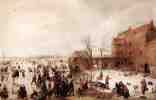![]()
 A Scene on the Ice near a Town
A Scene on the Ice near a Town
c. 1615; Oil on wood, 58 x 89.8 cm; National Gallery, London
Hendrick Avercamp was known as
de stom van Kampen
(the mute of Kampen)
because he was dumb. He was baptized in the Old Church in Amsterdam on
27 January 1585 but in the following year his parents moved to Kampen
where his father was the town apothecary. Avercamp seems to have
trained in Amsterdam with Pieter Isaacsz., who was a history painter,
portraitist and draughtsman in an elegant, late Mannerist style quite
unlike that of Avercamp. Avercamp's manner is based in the first place
on that of the Flemish followers of
Pieter Bruegel the Elder
and he
presumably came into contact with some of his followers who had
settled in Amsterdam, such as David Vinckboons. Avercamp developed the
style of Bruegel and Vinckboons in the direction of more decorative
effects, creating scenes crammed with small figures and full of
incident. He also possessed a refined sense of colour, carefully
placing pinks, reds, blacks and whites with touches of yellow and
green to create delicate and subtle effects. He principally painted
winter scenes and made many watercolours of these and of fishermen and
peasants: a large group of these watercolours is in the Royal
Collection.
There are dated paintings by Avercamp from 1608 until 1632 but they show relatively little development in style: the earlier paintings are more 'Flemish', that is, closer to Bruegel and his followers; but once he had mastered a successful style Avercamp saw little need to change it substantially. The dating of paintings which do not bear a date is therefore difficult but this particular winter landscape appears to be from about 1615. Under the pale winter sky a frozen waterway receding into the far distance provides the stage for lively diversions upon the ice, such as 'kolf' (an early form of golf). It has been supposed that the building on the right is the Half Moon Brewery at Kampen, where Avercamp lived and worked, but only a few barrels outside suggest it is a brewery, and the vaguely indicated town in the distance does not seem to be Kampen; it is more likely to be imaginary. The tower is closer to that of the Sint Cunerakerk in Rhenen.
Avercamp was buried in the Sint Nicolaaskerk in Kampen on 15 May 1634. His nephew, Barent Pietersz. Avercamp, who also lived and worked for much of his life in Kampen, was a close follower, as was Arent Arentsz. of Amsterdam.